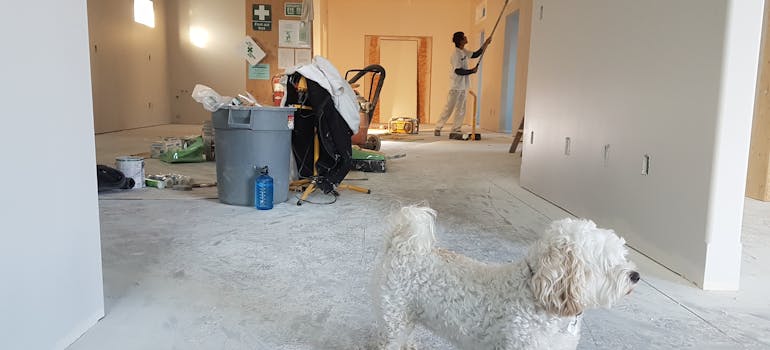Deciding where to live is a big choice in our lives, often leaving us at a crossroads: should we opt for a house or an apartment? This decision goes beyond one’s taste. It involves factors such as finances, lifestyle preferences, and long-term goals. If you are in the phase of choosing between these two types of accommodation, exploring certain factors will help you make a choice that aligns with your needs. Whether you’re a first-time buyer, a renter, or simply contemplating a change, understanding the differences between living in a house or an apartment is essential. Let’s embark on this journey to discover which option, a house or an apartment, is the perfect fit for you.
What is your budget?
When choosing between a house and an apartment, your budget often plays the leading role. Houses typically demand a higher initial investment due to larger down payments and closing costs. In contrast, apartments, especially when rented, require less upfront money, making them an attractive option for those with budget constraints. However, the financial considerations extend beyond just the initial costs. When you are figuring out how much money you have at your disposal, don’t forget about the expenses related to the relocation, such as the fees of moving services Northern VA companies offer, etc. Here’s a breakdown of the typical expenses you’ll encounter if you buy a house:
- Initial investment: Houses usually have higher purchase prices and down payments compared to apartments.
- Mortgage: Monthly mortgage payments for houses can be higher than rent for an apartment, though this can vary widely based on location and market conditions.
- Maintenance costs: Owning a house means you’re responsible for all maintenance and repair costs. In apartments, most maintenance issues are handled by the landlord or management.
- Utility bills: Typically, houses have higher utility costs due to larger space. Apartments, being smaller, usually cost less to heat, cool, and power.
- Property taxes and insurance: Homeowners face property taxes and homeowner’s insurance, which can be substantial depending on the property’s value and location. Renters usually pay a smaller renter’s insurance premium.
- HOA fees: Some houses and apartments have Homeowners Association (HOA) fees, which can add to monthly expenses.

How much space and privacy do you need?
Choosing between an apartment and a house often boils down to how much space you need and the level of privacy you desire. Houses generally provide more room and seclusion, whereas apartments offer different advantages in these areas.
Space in houses vs. apartments
Houses typically come with more square footage, offering multiple bedrooms, expansive living areas, and outdoor spaces like yards and gardens. This extra space may be a deal-breaker for large families, those who entertain frequently, or individuals with hobbies that require ample room. On the flip side, apartments, with their more compact design, cater to a lifestyle that values efficiency and ease of maintenance. The smaller space is quicker to clean and manage, making it ideal for busy professionals, singles, or small families who don’t need excessive space. Also, there’s always the option of renting additional space such as self storage Lorton VA option, for example. Ultimately, it’s all a matter of personal choice.

Privacy considerations
When it comes to privacy, houses generally have the upper hand. With no shared walls and often more distance between neighbors, houses offer a secluded environment where noise and external disturbances are minimized. In contrast, apartment living involves closer proximity to neighbors, which can lead to a more social atmosphere but may also result in less privacy and potential noise issues. The choice here depends on your preference for solitude versus a sense of close-knit living. So, once you give the local movers VA offers a call, make sure you are set on what you want.
Lifestyle and flexibility
When you are wondering whether you should choose a house or apartment, ask yourself how flexible your lifestyle is. A house often resonates with those seeking a stable, long-term residence. It’s an ideal setting for families or individuals with growth plans, offering ample space for children, pets, and hobbies. It’s not ideal for those who love moving around.
Urban living and convenience in apartments
On the other hand, an apartment might be the perfect fit for someone who enjoys the pulse of city life. Young professionals, couples, or small families often gravitate towards apartments due to their convenience and proximity to urban amenities. Living in an apartment means being close to work, cultural hotspots, and a vibrant social scene. For example, some of the relocation experts working for the Reston VA moving companies say most of the people they have relocated to apartments chose such homes for the location benefits they come with. Essentially, this setup suits those who prioritize ease of access over spacious living.
Maintenance and upkeep
The responsibilities and efforts involved in maintaining a house versus an apartment can greatly influence your living experience. Although this may seem like an irrelevant factor, you should know that people spend a significant amount of time cleaning their homes, and that amount increases with the increase in the home size.
Maintenance in houses
Owning a house means taking on the full responsibility of maintenance, from routine tasks like lawn care to major repairs like roofing. And, as a rule, houses are bigger than apartments. This requires either personal time and effort or the financial resources to hire professionals. While this can be a significant commitment, it also offers the freedom to control the quality and timing of these tasks. For homeowners, the convenience of delivery service Northern Virginia offers can be a significant aid in maintaining and upgrading their property. However, maintaining a house still takes more time than is the case with apartments.
Upkeep in apartments
In contrast, apartment living often comes with less maintenance responsibility. Most repair and upkeep tasks fall under the purview of the landlord or property management. This can significantly reduce the time and effort you need to spend on maintaining your living space. Naturally, it makes apartments an attractive option for those who prefer a more carefree lifestyle or lack the time for home maintenance.

Do you have friends and family over a lot?
When you ask yourself whether to get a house or apartment, it is important to consider how often do you have people over. The answer to this question can greatly influence your decision. Apartments often foster a more immediate sense of community due to proximity. Living in an apartment complex can lead to more frequent and casual interactions with neighbors. This can be advantageous for those who enjoy socializing or need a sense of connectedness in their daily life. Communal areas like pools, gyms, or lounges in apartment complexes also provide spaces for residents to mingle and form bonds.

Building community in apartment Living
Houses offer a different kind of social setting. While they provide more privacy, they also allow for deeper community ties in the neighborhood. Also, if you prefer having people over in your home, you must have enough space to manage this. For that kind of socializing, houses are a better option. Moreover, social interactions in residential areas might be less frequent but can lead to more meaningful relationships over time. Neighborhood events, local clubs, or community projects are common in residential areas and offer opportunities for homeowners to connect and engage with their neighbors. If you’re relocating from afar, long distance moving companies Northern VA hosts can help ease the transition, allowing you to focus on building your new community.
House or apartment – which one is a better investment?
When deciding between a house and an apartment, you’ll probably wonder whether your choice will be a good investment for the future. The truth is that both can be sound investments. However, they differ in terms of risk, reward, and financial implications.
Long-term investment in houses
Investing in a house is often viewed as a traditional and stable financial move. Houses typically appreciate over time, particularly in thriving real estate markets. This appreciation can lead to substantial equity gains for the homeowner. Additionally, owning a house provides the opportunity to enhance its value through home improvements and renovations. The financial benefits of house ownership go beyond just appreciation. They also include potential tax deductions related to mortgage interest and property taxes. However, these financial perks come with the responsibility of maintenance and the need for a significant initial financial outlay. Eventually, it’s a good idea to ask experts for their advice on that. Once you set up a team of professionals that will include relocation experts such as the Fairfax County movers, real estate agents, and financial advisers, this endeavor must be successful.
Appreciation and flexibility in apartments
Apartments, especially in high-demand urban areas, can also be solid investments. They often come with a lower initial purchase cost compared to houses and can be appreciated, although sometimes at a different rate. For those looking to enter the real estate market without the larger commitment of a house, an apartment can be an attractive option. The benefits of apartment ownership include rental income potential, which can provide a steady stream of passive income, and in some markets, rapid appreciation.
Evaluating market trends and personal goals
It’s important to evaluate current real estate market trends and consider your personal financial goals when choosing between a house and an apartment. Each option has its own set of financial implications and potential returns on investment. Factors like location, market demand, and personal financial plans should guide your decision.

How personalized do you want your home to be?
The degree of personalization and control you desire in your living space is another big factor to consider. Owning a house generally offers more freedom to modify and personalize your space. Apartments, especially rentals, come with more restrictions. Therefore, make sure that those precious items prepared for you by the packing service Northern Virginia provides, arrive at exactly the type of home you will be happy living in. Here’s a closer look at this factor:
- Interior modifications. Homeowners have the liberty to change layouts, update fixtures, and repaint. Apartment dwellers usually need permission for any significant changes.
- Outdoor space. Houses often come with yards that you can landscape and use as you wish. Apartment balconies offer limited outdoor personalization.
- Decorating freedom. Homeowners can choose any decor style without restrictions. Apartment renters may face limitations on wall hangings, paint colors, and major installations.
- Pet policies. Houses typically don’t have restrictions on pet ownership. Apartments may have strict pet policies, including limitations on size, breed, or number of pets.
- Noise and activities. In a house, you have more freedom regarding noise levels and activities. Apartment living requires more mindfulness of neighbors and noise.
- Long-term changes. Homeowners can plan for long-term changes like expansions or major renovations. Apartment renters are limited to the existing layout and facilities.
Your desire for a highly personalized living space or a hassle-free, managed environment will greatly influence your choice between these two accommodation options.

So, which is better, house or apartment? Only you know the answer
As we’ve seen, each of these options offers its advantages and challenges, whether it’s the financial commitment of a house or the convenience and flexibility of an apartment. The choice ultimately hinges on a careful assessment of your personal needs, financial situation, and future aspirations. Never forget that what works best for one person might not be ideal for another. We hope this exploration of key factors has provided valuable insights, guiding you toward a decision that complements your lifestyle and brings you a step closer to your dream home. In the end, whether you choose the sprawling space of a house or apartment and its cozy confines, the most important thing is that it feels like home to you.


